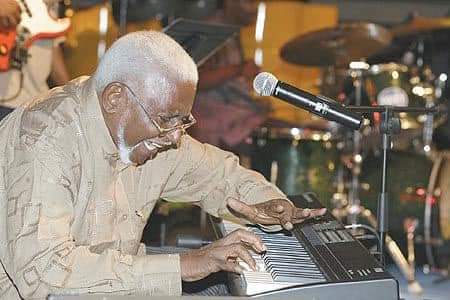Clive 'Zanda' Alexander, architect of kaiso jazz, dies

Clive “Zanda” Alexander, the musician regarded as the father of kaiso jazz, died on Thursday at 82.
The Clive Alexander Trio's bassist Russell Durity told Newsday he died around 12.30 am.
Alexander had been admitted to the St James Medical Complex about five days ago complaining of low blood sugar, he said. Durity said that escalated and doctors determined he was suffering renal failure.
He was transferred to the Port of Spain General Hospital, where his wife, Carlene Sankar, was shocked to see him surrounded by as many as eight doctors. Durity said she was told to brace for the worst.
Zanda, a retired architect by profession, had had diabetes for some time and had had some minor strokes late last year, he said, and died as a result of complications from diabetes.
A release from the Ministry of Tourism, Culture and the Arts said Zanda was born in Siparia and was the brother of steel orchestra Desperadoes’ arranger Carlton Alexander.
It added that he was s self-taught musician and started making at music at ten.
“It was while studying architecture in England he had his first experience with live jazz music and later established his band which fused kaiso (calypso) and jazz music in their renditions,” the release said.
It added that he was a master of improvisation and performed at jazz events locally, regionally and internationally. The release quoted Minister of Tourism, Culture and the Arts Randall Mitchell as saying, “Clive ‘Zanda’ Alexander has made an outstanding contribution to the kaiso jazz genre and he leaves us with a rich musical legacy.
“We are certainly grateful for his contribution to culture and the arts and his creativity will be missed.”
Durity said he and Zanda had known each other off and on since 1980, when Durity was a teenager. They began working together around 2003.
“He approached me after I had left Michael Boothman’s Kysofusion,,,and asked me if I wanted to do a workshop for one month learning his method of improvisation around that time, which I jumped at.
"At the end of that month he decided we should do some gigs together.”
For the past 18 years, Durity played with Zanda, with Richard Joseph on drums. He considers himself fortunate to have had Zanda in his life and regarded him as a teacher and mentor.
He said Zanda’s first album, Clive Alexander is Here with Dat Kind of Ting, was released in 1976 . He said the album came out of a series of workshops Zanda was holding with Scofield Pilgrim at Queen’s Royal College (QRC).
He said at that time Zanda did not have a name for the genre but it became known as kaiso jazz, and that is why he is referred to as the father of the genre.
Jazz concert promoter and music writer Nigel Campbell said he first met Zanda, officially, in 2005 but his engagement with his music goes way back to the first album in 1976. He said Zanda had done a version of Sparrow’s 1968 Good Morning Mr Walker and he first thought it was American jazz pianist Dave Brubeck.
He remembered saying, “’Wow, boy, Sparrow got Dave Brubeck to play his music! How great is that?’”
Campbell said he was later told tit was a local musician and something then clicked in him: “Oh my God, we have musicians of the ilk of Dave Brubeck who can make our calypso music go global!”
Campbell said he thought kaiso jazz would be the key to getting onto the international market and this made him a lifelong fan of the music and of Zanda.
Over the years what got his attention was that Zanda did not put out a lot of recorded music, he said.
“Zanda was a person you had to hear him perform live, like a lot of jazz musicians: they improvise. A performance today may not be the same performance tomorrow.”
In 2005, he heard Zanda playing at Jazz Artists on the Greens, Farm Road, St Joseph, when they met. Since then he was able to interview Zanda and do podcasts with him.
He said in 2018 his team, Production One Ltd, had gone into partnership with the University of Trinidad and Tobago (UTT) and put on a concert where Zanda played his first album live in September 2018. It was probably one of the last major concerts he did, Campbell said.
For him it is important that people recognise that TT is a place that discards its cultural heroes.
“Critically, one of the things we don’t do is record enough of our music. So we have had thousands of calypsoes that have only been sung in a tent and never recorded. And Clive, who put out a lot of music, only recorded effectively about four or five albums."
He said luckily, Zanda’s first album was re-released in 2017 and so it is on Spotify and Apple Music, but his other music isn’t and it was a sad thing. He feltTT should celebrate what it has and it was up to the county to secure the legacy and ensure it never fades.
Durity said as soon as there are confirmed funeral arrangements they will be posted.
Zanda leaves to mourn his wife Carlene Sankar and his six children.


Comments
"Clive ‘Zanda’ Alexander, architect of kaiso jazz, dies"